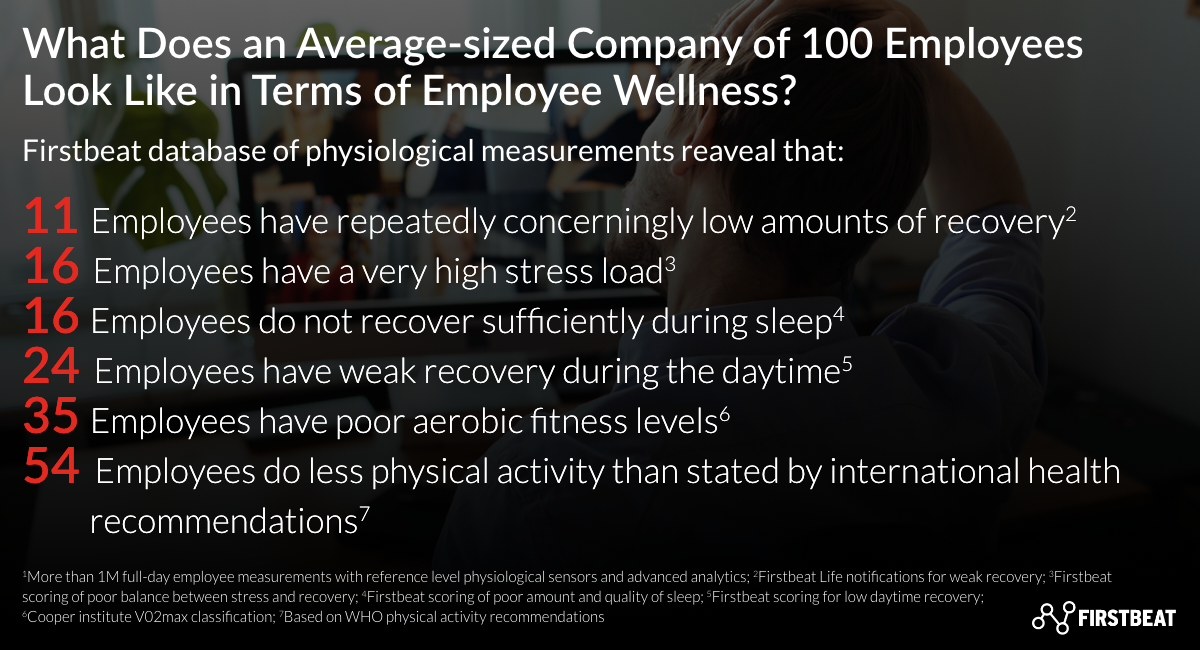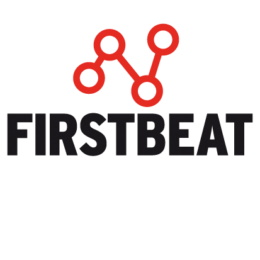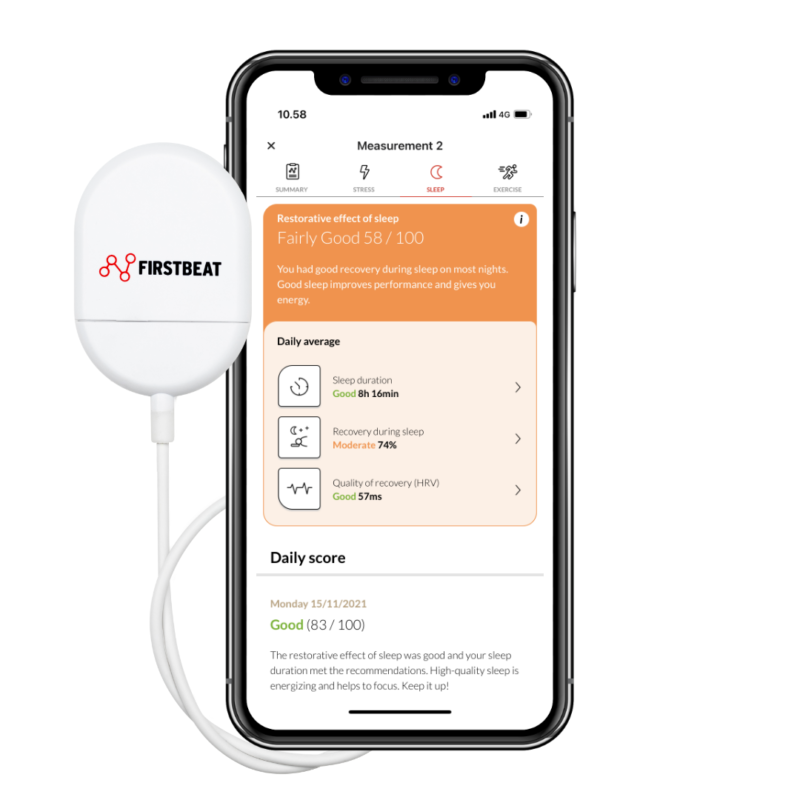
According to Firstbeat’s database of physiological measurements1, average findings for a company of 100 employees reveal that:
- 54 Employees do less physical activity than stated by international health recommendations*2
- 35 Employees have poor aerobic fitness levels*3
- 16 Employees have a very high stress load*4
- 11 Employees have repeatedly concerningly low amounts of recovery*5
- 16 Employees do not recover sufficiently during sleep*6
- 24 Employees have weak recovery during the daytime*7
More than half of employees are not active enough
The Firstbeat findings show that more than half of employees are not as active as they should be, with 54 out of 100 employees doing less physical activity than is recommended by the World Health Organization, and 35 employees in 100 having poor aerobic fitness levels.
One of the reasons for the decline in fitness levels can be attributed to recent changes in our working style. Firstbeat’s Director of Wellness Business, Juho Tuppurainen notes: “It is known that remote and hybrid work increases passivity in our daily lives, something we can now see based on hundreds of thousands of measurements from Firstbeat big data.”
The WHO ranks sedentary lifestyle as one of the leading independent risk factors of death and disability, so it’s important for companies to work together with employees to build more physical activity into their daily routines. Tuppurainen advises, “Some ideas include allocating time for physical activity in your calendar until it becomes a habit, beginning the workday with a shared morning exercise, or organizing walking meetings with colleagues.”
High-stress loads associated with poor recovery during working hours
The Firstbeat data findings also reveal that in the same company of 100 people, an average of 16 individuals has a very high stress level, and 11 individuals experience consistently poor recovery.
By using professional tools like Firstbeat Life to measure employee stress and recovery, it’s easy to identify any concerning trends that require attention within the organization and pinpoint the causes of stress. Understanding these factors helps tackle the issues head on and direct wellness investments accordingly.
For example, employers can directly see the impact that making changes to increase physical activity in employees’ daily lives has on their stress and recovery balance.
Tuppurainen says: “By measuring with Firstbeat Life, it is possible to show to employers and employees how lifestyle factors (such as sleep and exercise) affect employee well-being, and it prompts individuals to address their own situation.
“We’ve seen how the data can help the organization to act, for instance, building a culture where taking breaks and not responding to emails in the evening can make a huge impact on employee well-being.”
Poor recovery is an issue during the day and night
When it comes to sleep, the Firstbeat data findings show that in the same company of 100 people, 16 employees do not recover sufficiently during sleep. Restorative sleep is the basis of good health and performance – it helps the body recover from stress, physical exertion, and fatigue.
When it comes to improving sleep quality, this is heavily affected by our behaviors and habits during the day and can include factors such as how busy or stressed we are, the amount of caffeine or alcohol consumed, eating rhythm, exercise habits, and evening routine.
The data shows that 24 employees out of 100 have weak recovery during the daytime. If an employee’s stress level is heavy all day, then it may be necessary to build in more moments of recovery such as 10-minute microbreaks or physical activity into the workday to help improve the quality of sleep and enhance well-being.
This is where Firstbeat Life can be incredibly useful as it allows employers and employees to identify behaviors that maintain heavy stress levels and impact sleep negatively.
About Firstbeat:
Firstbeat Life is the most advanced technology for balancing stress and recovery. It helps each employee to improve their well-being and aids organizations in making data-driven decisions to promote workplace health and wellness. Firstbeat Life consists of a wearable personal measurement device, mobile app, and online Admin tool to access clients’ measurement data and reports. Firstbeat Life turns stress, recovery, sleep, and exercise data into actionable insights – helping to manage stress, prevent burnout, and inspire positive lifestyle changes.
For more information visit https://www.firstbeat.com/en/firstbeat-life/
1More than 1M full-day employee measurements with reference level physiological sensors and advanced analytics
2 Based on WHO physical activity recommendations
3 Cooper Institute V02max classification
4 Firstbeat scoring of poor balance between stress and recovery
5 Firstbeat Life notifications for weak recovery
6 Firstbeat scoring of poor amount and quality of sleep
7Firstbeat scoring for low daytime recovery
Are you ready to benefit from physiological data in your services and coaching? Firstbeat Life helps you to promote health and well-being at work, identify potential health risks, and help employees to perform at their best. Book a demo today.
If you liked this article, you should subscribe to our newsletter.


